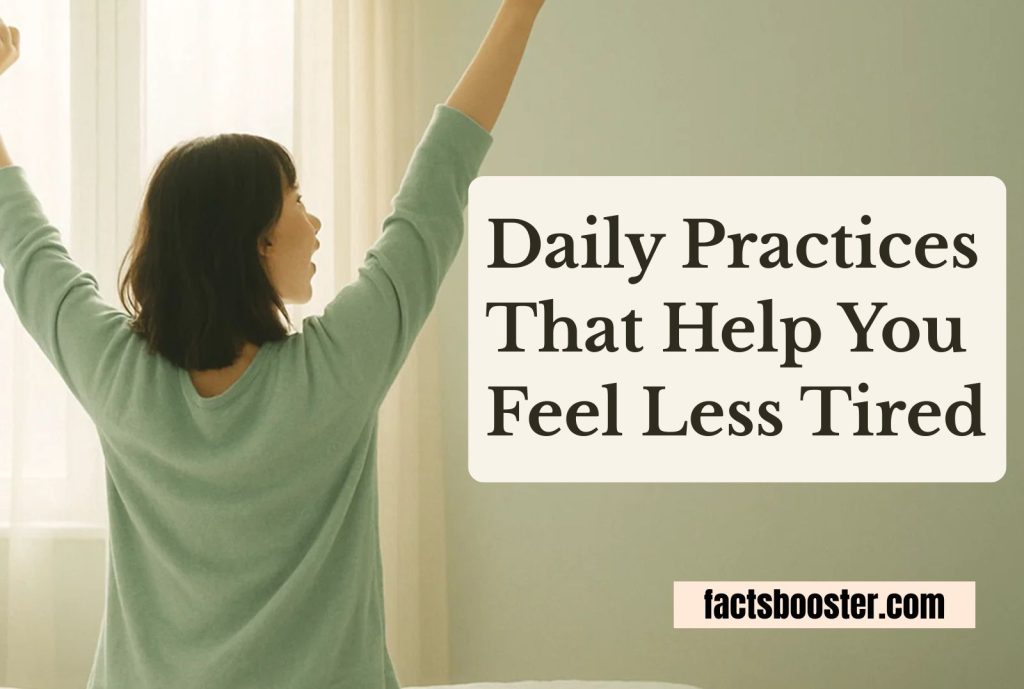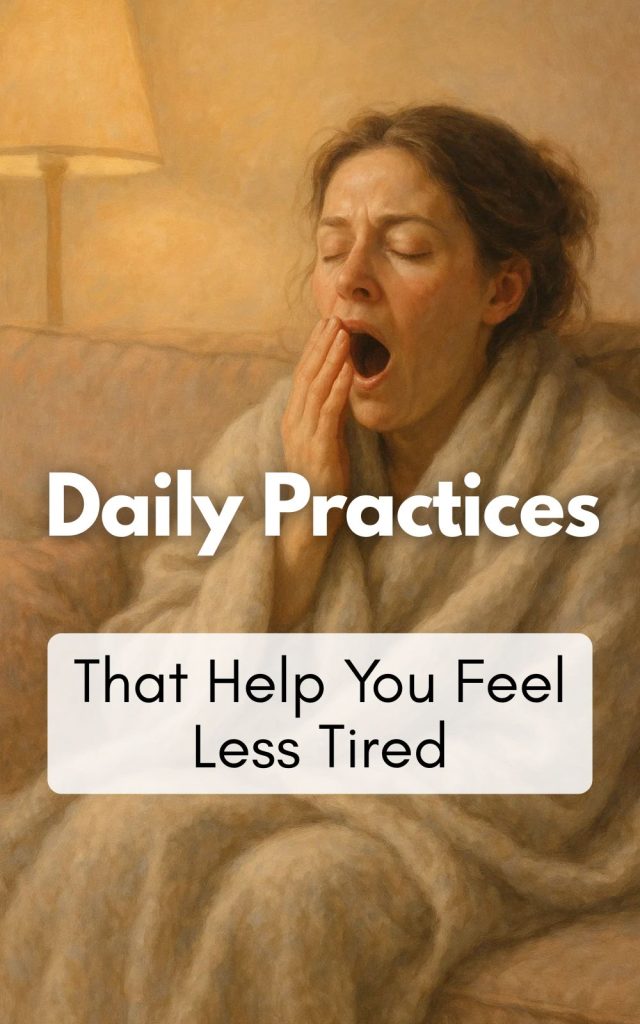When 3 PM Hits and Your Energy Doesn’t
It’s 3 PM, and you’re staring blankly at your screen. Your coffee cup is empty, but your body still feels like it’s dragging a weight behind it. Your mind? Foggy at best. Maybe you hit snooze three times this morning, grabbed nothing for breakfast, or powered through lunch without actually stopping. Sound familiar? If so, you’re not alone — and that’s exactly why daily practices that help you feel less tired can make such a difference.
I lived this way for years. Didn’t matter if I slept eight hours or ten—by mid-afternoon, I was toast. It wasn’t just being tired. It was deeper than that. My days had no real rhythm. I was constantly reacting to whatever came at me instead of moving through my day with any kind of balance. And the result? A fatigue loop I couldn’t seem to escape.
The weird thing is, I thought this was just normal. Like maybe some people are just naturally low-energy, and I drew the short straw. But that wasn’t it at all. I wasn’t broken—I was just approaching my days all wrong.

Energy Isn’t Something You Chase Down
Here’s what changed everything for me: I realized energy isn’t something you hunt for in your third cup of coffee or your fifth “just five more minutes” nap. It’s something you build. You nurture it.
All those tiny choices I thought didn’t matter—when I actually got out of bed, what I ate (or didn’t eat), whether I took real breaks—they were actually running the show. These weren’t minor details. They were shaping how I felt all day long.
When I started looking into daily practices that help you feel less tired, I expected to find some complicated system or expensive supplements. Instead, what I found was almost embarrassingly simple. Small adjustments. Tiny shifts in how I structured my day. Nothing dramatic, but the impact? That was dramatic.
So I started experimenting with a few simple things that actually made a difference:
Morning Mindfulness (Even 3 Minutes Counts)
Just a few minutes of breathing deeply or sitting quietly in the morning tells your nervous system, “Hey, we’re awake now.” That tiny pause? It sets the tone for everything that follows. I used to roll out of bed and immediately check my phone, diving straight into emails and stress. Now I sit on the edge of my bed, take five deep breaths, and just notice how I feel. That’s it. But those five breaths changed my mornings completely.
Move Your Body
I’m not talking about crushing a workout or training for a marathon. A walk around the block, some easy stretches, a few yoga poses—anything that gets your blood moving. More oxygen to your brain and muscles means more natural energy. Simple as that. Even on days when I feel too tired to move, getting up and doing a few stretches always—always—makes me feel better than staying still.
Check In With Your Energy, Not Just Your To-Do List
When that afternoon slump hits, it’s usually your body asking for something—and it’s not another coffee. Stop for a second. Notice how you actually feel. Drink some water. Take a real break. It keeps the exhaustion from snowballing. I learned this the hard way after years of pushing through fatigue, thinking I was being productive. Spoiler: I wasn’t. I was just burning out faster.
Mind What You’re Eating
Those sugary snacks or quick carbs might give you a boost for twenty minutes, but the crash is brutal. Protein, healthy fats, complex carbs—that’s what keeps your energy steady instead of sending you on a rollercoaster. I used to grab a muffin or pastry mid-morning, feel great for about half an hour, then crash harder than before. Now? I keep nuts, hard-boiled eggs, or apple slices with almond butter nearby. The difference in how I feel throughout the day is night and day.
Wind Down at Night
Resetting your energy isn’t just about what you do during the day. Your evenings matter too. Put the screens away earlier, dim the lights, take a few minutes to decompress. Your nervous system needs that signal to relax and actually recharge. I started reading physical books again instead of scrolling through my phone before bed. My sleep improved within days, and I woke up actually feeling rested instead of groggy.
These aren’t complicated. But they work. They remind you that your body’s energy has a natural rhythm—and when you pay attention to it, you can actually support it instead of fighting it.
Why These Daily Practices That Help You Feel Less Tired Actually Work
The thing about fatigue is that it’s rarely about one big problem. It’s usually a bunch of small things piling up—poor sleep, dehydration, sitting too long, stress, irregular eating, constant stimulation. Your body is trying to keep up, but it’s running on fumes.
These daily practices that help you feel less tired work because they address the actual root causes instead of just masking symptoms. Coffee masks fatigue. Movement, hydration, and real food actually create energy. There’s a difference.
I also realized that energy management is about working with your body’s natural cycles, not against them. We’re not machines that can run at full speed for eight hours straight. We need rhythm—periods of focus followed by rest, activity followed by recovery. When I stopped trying to power through everything and started honoring those natural cycles, everything changed.
Here’s Where You Actually Start
The practices I just walked you through? They’re the backbone of the 7-Day Energy Reset. It takes these small daily actions and walks you through them in a structured, week-long plan. You’ll learn to tune into your body’s rhythm and build habits that help you feel more balanced and energized—no caffeine dependency, no extreme overhauls, no gimmicks.
Think about it: if you spend just one week noticing and adjusting these small things, you’re creating a pattern that sticks. You’ll have more energy, better focus, and feel more like yourself. It’s not about doing everything perfectly. It’s about learning to work with your body instead of constantly working against it.
The 7-Day Energy Reset gives you a framework. Each day focuses on one key area—movement, nutrition, rest, mindfulness—and helps you build awareness around how your choices affect your energy. By the end of the week, you’re not just following a program. You actually understand your own body better. You know what drains you and what restores you.
And here’s the best part: once you know what works, you can customize it. Maybe you discover that morning walks are your secret weapon, or that eating protein at breakfast makes a huge difference. These daily practices that help you feel less tired become your practices—personalized to your life, your schedule, your needs.
Ready to Actually Feel Different?
If you’re done with the daily fatigue cycle and ready to take control of your energy, the 7-Day Energy Reset is where you start. One week. That’s it. You’ll reconnect with your body’s natural rhythm, build habits that actually matter, and feel the difference in your energy and focus.
You don’t need to overhaul your entire life or commit to some extreme routine. You just need to start paying attention and making small adjustments. The daily practices that help you feel less tired aren’t about adding more to your plate—they’re about working smarter with the energy you already have.
👉 Download your free 7-Day Energy Reset guide today and start feeling more balanced, energized, and in sync with how your body actually wants to work.

References
- Gan, G. G. et al. (2021) — The effect of a single session of 30‑min mindful breathing in reducing fatigue among patients with haematological cancer: a randomized controlled trial. PubMed / NCBI. (1)
- Barakou, I., Sakalidis, K. E., & Hettinga, F. J. (2023) — Effectiveness of physical activity interventions on reducing perceived fatigue among adults with chronic conditions: A systematic review and meta‑analysis of randomized controlled trials. Nature (Scientific Reports). (2)
- Carmichael, K. E. et al. (2022) — Stair walking effects on feelings of energy and fatigue. Frontiers in Psychology. (3)


